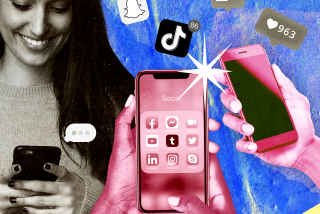Minorities Use the Web Differently
- Share via
A survey of African Americans and Latinos released Monday reveals that their online habits and tastes differ markedly from those of users in general. The distinctions are increasingly important as minority users come online at twice the rate of the overall population.
African Americans were more likely than other groups to focus on career advancement and professional development, education, family and relationships and entertainment, the survey by Los Altos-based Access Worldwide Cultural Access Group found.
Latinos, meantime, were more likely to use the Internet as a major source of news content, particularly for international news.
Both groups were less likely than the general population to seek financial or technological information online. However, they were much more concerned than users in general about the influence of the Internet on children and families.
Eighty-nine percent of Latino respondents had children at home, compared to 55% of African American online users and 37% of users in general. And half the African American respondents felt the Internet should be censored, twice the rate of Latino and nonminority respondents.
Internet accessibility is rapidly increasing, as are sites targeting multiethnic users. The survey of 3,500 online respondents set out to determine what role culture plays in that usage.
However, a “digital divide” still exists. One-third of the overall U.S. population uses the Internet at home, compared to just 16% of Latinos and 19% of African Americans, according to recent U.S. Department of Commerce statistics. And the gap is most pronounced for low-income minorities.
Another survey released Monday of low- to moderate-income adults in five Northeastern communities found that 56% said they knew “little or nothing” about the Internet. Of that group, however, 80% said they would be eager to participate in training.
According to this survey, which included 1,600 residents of Boston, Harlem, Brooklyn, Newark, N.J., and Hartford, Conn., cost is the biggest obstacle to becoming computer literate and accessing the Internet.
The survey, sponsored by the FleetBoston Financial Foundation and conducted by the University of Massachusetts Poll, found that income plays a bigger role than race in determining whether a household is hooked up to the Internet. For example, 44% of African Americans with incomes under $40,000 reported knowing nothing at all about the Internet, compared to just 15% for African Americans with incomes over $40,000.
Only 3% of survey respondents said they use the Internet to find out what is going on in their communities, indicating that the Internet is both underutilized by and perhaps not very useful to residents of low- and moderate-income communities.







